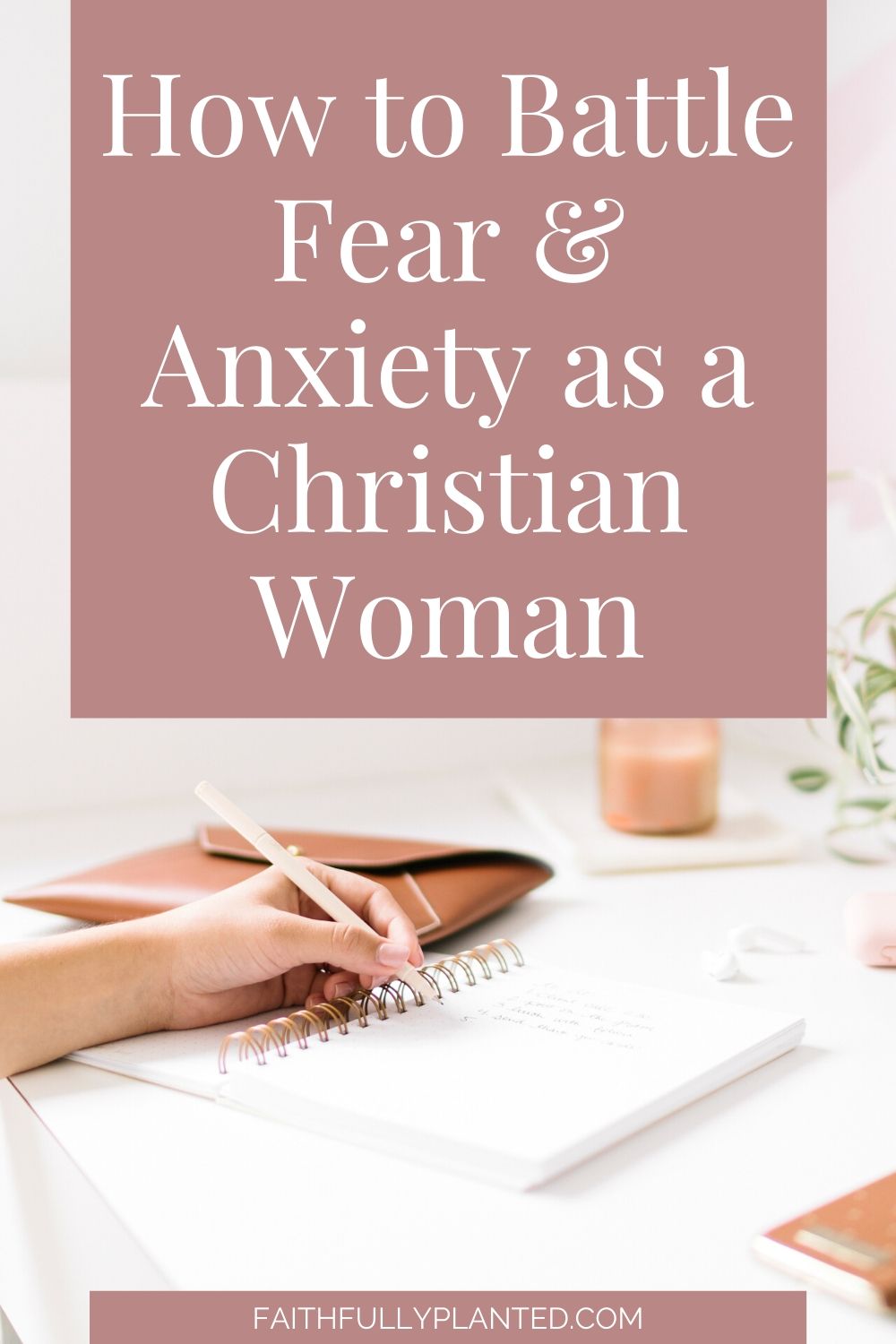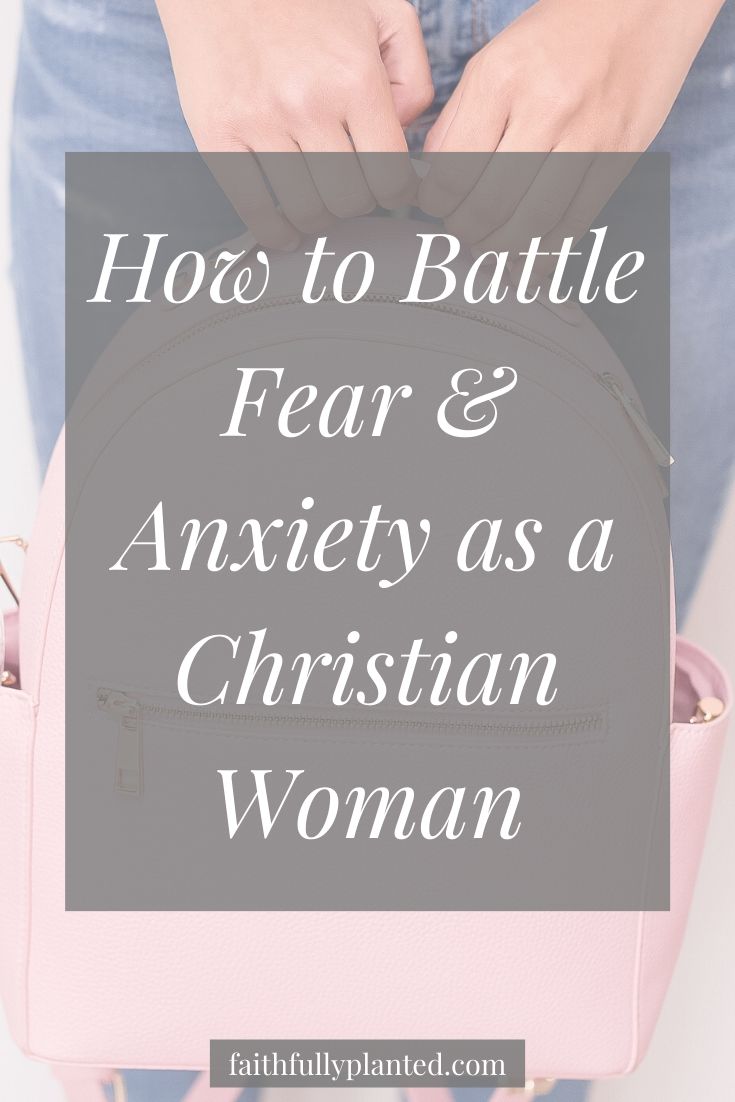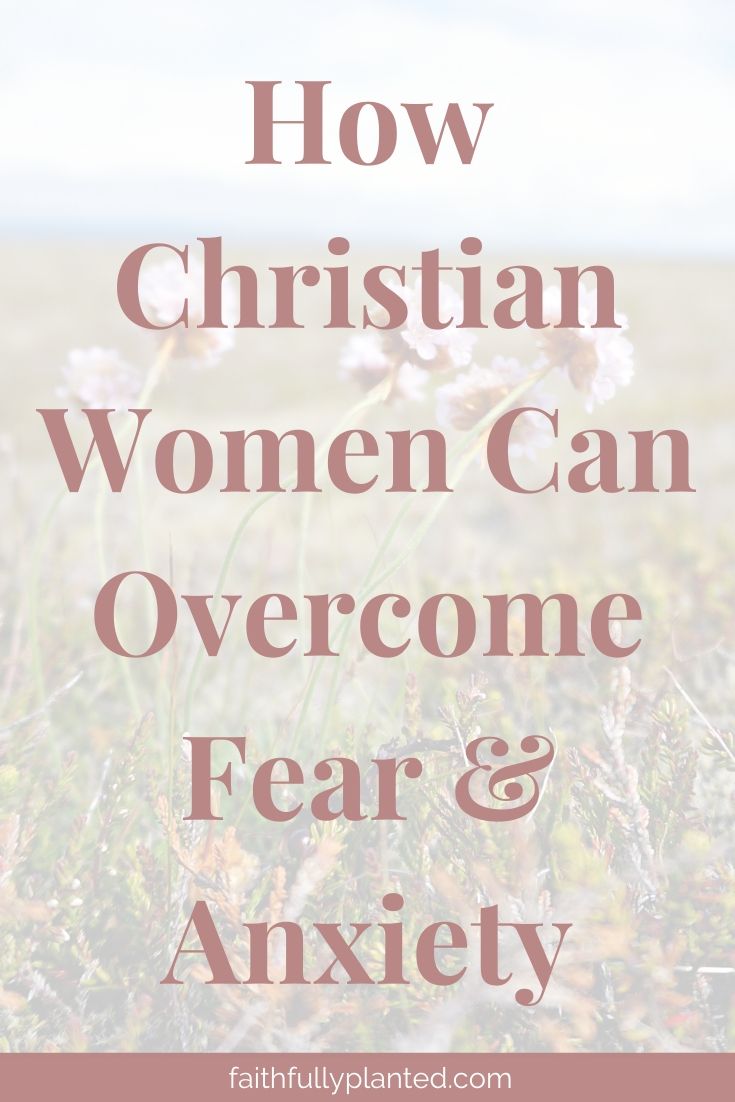
This post contains some affiliate links. If you make a purchase using my link, I may receive a small commission. I only recommend companies and products that I love and trust. This keeps the coffee brewing and the words flowing, so thank you for supporting Faithfully Planted!
What is anxiety? Where does it come from?
Anxiety is defined as “a feeling of worry, nervousness, or unease, typically about an imminent event or something with an uncertain outcome.” Fear and anxiety are often rooted in not knowing what is to come or being unsure of how something will turn out.
Anxiety is a carpet-bomb of “what ifs” on our sound minds.
Anxiety is a result of the fall. We live in a broken world where evil exists and bad things happen and information floods in faster than we can process it or discern truth from lie.
Anxiety is an attack from the enemy on our hearts and minds. It is rooted in doubt and fear, but it is not the same as fear. Fear is a response to a perceived or confirmed threat, while anxiety is a response to hypothetical threats.
Feeling both are normal, but they stem from different sources. We often use them interchangeably, but they are different. They do, however, both elicit a very similar response from our nervous systems that can result in thoughts, feelings, and actions that we normally wouldn’t think, feel, or do.
Anxiety is both spiritual and often a result of a very real physical condition. It is also often a result of trauma. Our bodies, souls, and minds are all intertwined and while anxiety can look the same across many people, the cause can come from different sources. Emotional and physical trauma can absolutely manifest in distrust and feelings that the sky will fall because, at one point, it did.
Anxiety exists on a continuum, from basic anxiousness from everyday worries to severe and chronic anxiety that cripples us. While it may present worse for different people at different times, the good news is that all anxiety is an enemy we have been equipped to fight.
Is feeling anxiety or fear a sin?
This is a big question and one I see a lot of Christians asking and struggling with.
So, let me assure you that feeling anxiety or fear is very normal. Every human feels these emotions at one point or another. Where it becomes an issue is when we let those emotions control us and our choices. Where sin comes in is when we choose sinful behaviors as a result of feeling fear or anxiety.
Feeling fear or anxiety is not wrong. You are not condemned for feeling a normal human emotion. What matters is what we choose to do with these feelings.
The feeling itself is not a sin but it can certainly lead to sinful behavior. This is why it is important to identify these feelings and face them head-on.
As Max Lucado says in his book, Anxious for Nothing, “the presence of anxiety is unavoidable, but the prison of anxiety is optional.” It certainly isn’t easy to overcome feelings of fear and anxiety, but it is possible through the power of Jesus living within us.
Let’s dive into some practical ways Christian women can battle fear and anxiety.

Acknowledge Your Feelings of Anxiety & Fear
It’s important that we resist the urge to numb out and avoid our feelings. Doing this only gives temporary relief and often makes the problem worse.
Whether or not you believe these feelings need to change or that they are unwelcome, they are real. Your anxiety and your fear are real. In order to face them and battle them, we have to acknowledge that they exist.
In order for us to take our thoughts and feelings captive and make them obedient to Christ (2 Corinthians 10:5), we have to stop hiding from them or pretending that they aren’t real. Or worse, believing that they are just part of who we are and cannot be changed or defeated.
A great exercise for this is to journal through your anxieties and fears, with no other agenda than to name them and put them on paper. If you’re comfortable, you can take it a step further and voice them to a trusted person in your life. There is power in naming our fears and choosing to face them in print or voice.
Lay Out Your Worries Before Jesus’ Feet
Prayer is one of our most effective weapons against anxiety and fear. The Bible clearly calls us to bring our fears and worries to the Lord. Philippians 4:6 is a roadmap for us to respond to our anxiety Biblically. It says, “do not be anxious about anything, but in everything by prayer and supplication with thanksgiving let your requests be made known to God.”
This is not a verse of condemnation but a verse of hope and practical guidance.
Prayer is not magic. It is not a one-time cure-all pill. It is an effective weapon in our arsenal.
Just like we don’t expect to lose 20 pounds with one workout and one day of healthy eating, we can’t expect one prayer to magically rid us of anxiety, unless the Lord chooses to miraculously heal. Healing from anxiety, like fitness and nutrition, is made up of daily choices and disciplines adding up to big change.
Regularly laying our worries at Jesus’ feet is one of those disciplines.
Get Off of Social Media
You probably hear this one a lot, but I’m so serious about it. Being on social media during a crisis or while you are struggling with fear or anxiety will aggravate those feelings and make them worse.
The access we now have to information is both a blessing and a curse. Our world moves a million miles a minute and new tragedies and catastrophes flood our brains every day via screens. There is a balance to be had between our responsibility to be informed and ignoring the world around us. It’s important to be aware, but we don’t need to know about every little thing.
We don’t always need to be invaded by other peoples’ highlight reels on social media or by every event taking place around the world.
You don’t have to be extreme and delete on your channels (though you certainly can), just try taking a break and putting your phone away. Start by finding blocks of time or a set day a week that you unplug. The more you do it, the better you will feel.
RELATED: 7 Things I Learned When I Deleted Social Media
Fill Your Heart & Head With Scripture
This one is likely obvious, but also difficult to put into action when you’re drowning in anxious thoughts. Being in God’s Word is both a preventative measure and a treatment. During times of calm and peace, we need to dig in and store up as many truths in our hearts as we can so that when we are in times of crisis, God’s word will be in our minds doing battle.
During times of anxiety and fear, we can draw on the truths we already know. We can be sustained by the Word written on our hearts.
When you are in the midst of anxiety and uncertainty, that may not be the best time to try and dive into deep Bible study. Our brains are physically unable to learn properly during times of distress, so these times would be when we turn to things like theologically sound devotionals, the Psalms or sermons about trusting God or His promises.
When your heart is filled with “what ifs” and unknows, let God’s Word be a balm to your soul.
Read to remind yourself that God is with you (Isaiah 41:10); read to remind yourself you are provided for (Luke 12:24); read to remind yourself that you are victorious in Jesus (1 Corinthians 15:57); read to remind your heart that you are redeemed and that your salvation is secure in Jesus’ death on the cross (John 5:24).
God’s Word is a gift to us. God knew that we would need a constant reminder of His truth and His promises to navigate this world. Use it, friend.
Practice Gratitude
Gratitude is the exact opposite of anxiety. Why? Because anxiety comes from a place of lack; it tells your heart that there isn’t enough of what you need, whether that be physical goods, money, shelter, etc. or emotional provisions like love and security.
Practicing gratitude interrupts the lack mindset that anxiety causes. While anxiety tells us we don’t have enough, gratitude reminds us that we do. Multiple studies have found correlations between gratitude and lower levels of anxiety and depression. While correlation does not equal causation, I don’t believe in coincidences.
The Bible calls us to choose gratitude in all circumstances (1 Thessalonians 5:18) because we always can. If we are Christian women who believe and confess that Christ died for our sins, we have something incredible to give thanks for.
This practice can be very simple and doesn’t need to take a lot of time. Start by simply saying or writing down 3 things you are grateful for at the beginning and/or end of each day.
Eventually, this practice will get easier and you’ll be attuned to more positive thinking. Below, you’ll find a post I wrote to give you some Bible verses to help you practice gratitude.
RELATED: 15 Bible Verse To Help You Cultivate Gratitude
Move Your Body
When you are fighting a battle in your mind, one of the best things you can do is move your body. Go for a walk. Workout. Get out in nature as you’re able. Stretch or do yoga. Dance in your kitchen. Just get moving.
The benefits of exercise are undisputed but did you know that moving your body can also help improve your mental health as well as your physical health?
Exercise releases endorphins, which are natural mood lifters. God created our bodies and our hormones to work this way. Endorphins reduce the brain’s perception of pain and increase activity in the pleasure center of the brain. This results in a lifted mood and something sometimes referred to as a “runner’s high” or “exercise high.”
Getting out in creation, using the body you’ve been blessed with and getting a change of scenery can all deliver relief from overwhelming anxiety. Some find it more helpful than others, but no matter the level of relief it provides, it’s a positive choice to move your body as your able.
Challenge & Replace Irrational Thoughts
A cornerstone symptom of anxiety is racing thoughts and irrational thoughts. Anxiety perceives an imagined threat and this can often escalate into thoughts that are out of touch with reality. A way to interrupt these is to name them, challenge them with rational thinking and then replace them with the truth.
Often our anxiety is not caused by an event or emotion, but rather what we believe about that event. By breaking this down, we can gain clarity and shift our thinking to what is real and true.
This is an exercise many therapists and counselors use that stems from Cognitive-Behavioral Therapy originally developed by Albert Ellis.
This exercise called the ABC method is one way to do this.
First, you identify the Antecedent or event. Second, you identify your Beliefs and thoughts surrounding the event and third, you identify the Consequence of those beliefs, such as negative thoughts and coping behaviors.
Once these are identified, you can then Dispute these thoughts, feelings or actions and replace them with what is real and what Scripture says is true., also called Effective thinking.
Ask For Help
Help can look like a lot of different things. It can look like going to a pastoral or therapist for counseling or joining a support group. It can look like finding a prayer partner or sponsor. Or it can look like asking for what you need from other people in your life.
God’s plan for healing you may include counseling or medication or both.
It may look like seeking out resources such as this and other articles to help you take action with your anxiety.
God created us for community and to support one another. Asking for help is not a weakness; it’s strength. The world tells us all the time that we have to be able to do things alone and that we’re enough without help but the truth is, no one was meant to go through life that way.
We need each other and sometimes, we all need a little help.
What helps you through anxious times? What exercises or habits have you created that help you choose faith over fear?




I do struggle with anxiety and fear..due to growing up in negative environment and doing drugs. End up in mental hospital. I’m learning to be real with the Lord with my feelings and anxious thought without been judge or condemn to die.. so yes. I know our Lord is just God. Merciful and restore of life. I shall
Live and not die..thank you for this article. Dealing with anxiety..